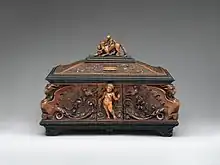casket
English

Italian jewelry casket, from 1857, made of carved walnut, ebony and lined with red velvet
Etymology
Probably from Norman cassette. Possibly reformed by analogy with cask,[1][2] thus analyzable as cask + -et. Doublet of cassette.
Pronunciation
Noun
casket (plural caskets)
- A little box, e.g. for jewellery.
- 1826, [Mary Shelley], chapter V, in The Last Man. […], volume I, London: Henry Colburn, […], →OCLC:
- They will be here at five, take merely the clothes necessary for the journey and her jewel-casket.
The Hunt for the Red Casked
- (British) An urn.
- (Canada, US) A coffin.
- (nautical) A gasket.
Derived terms
- casket magazine
- closed casket
Translations
little box e.g. for jewelry
|
urn
coffin — see coffin
Verb
casket (third-person singular simple present caskets, present participle casketing, simple past and past participle casketed)
- (poetic, transitive) To put into, or preserve in, a casket.
- c. 1604–1605 (date written), William Shakespeare, “All’s Well, that Ends Well”, in Mr. William Shakespeares Comedies, Histories, & Tragedies […] (First Folio), London: […] Isaac Iaggard, and Ed[ward] Blount, published 1623, →OCLC, [Act II, scene v]:
- I have […] casketed my treasure.
Related terms
References
Anagrams
This article is issued from Wiktionary. The text is licensed under Creative Commons - Attribution - Sharealike. Additional terms may apply for the media files.